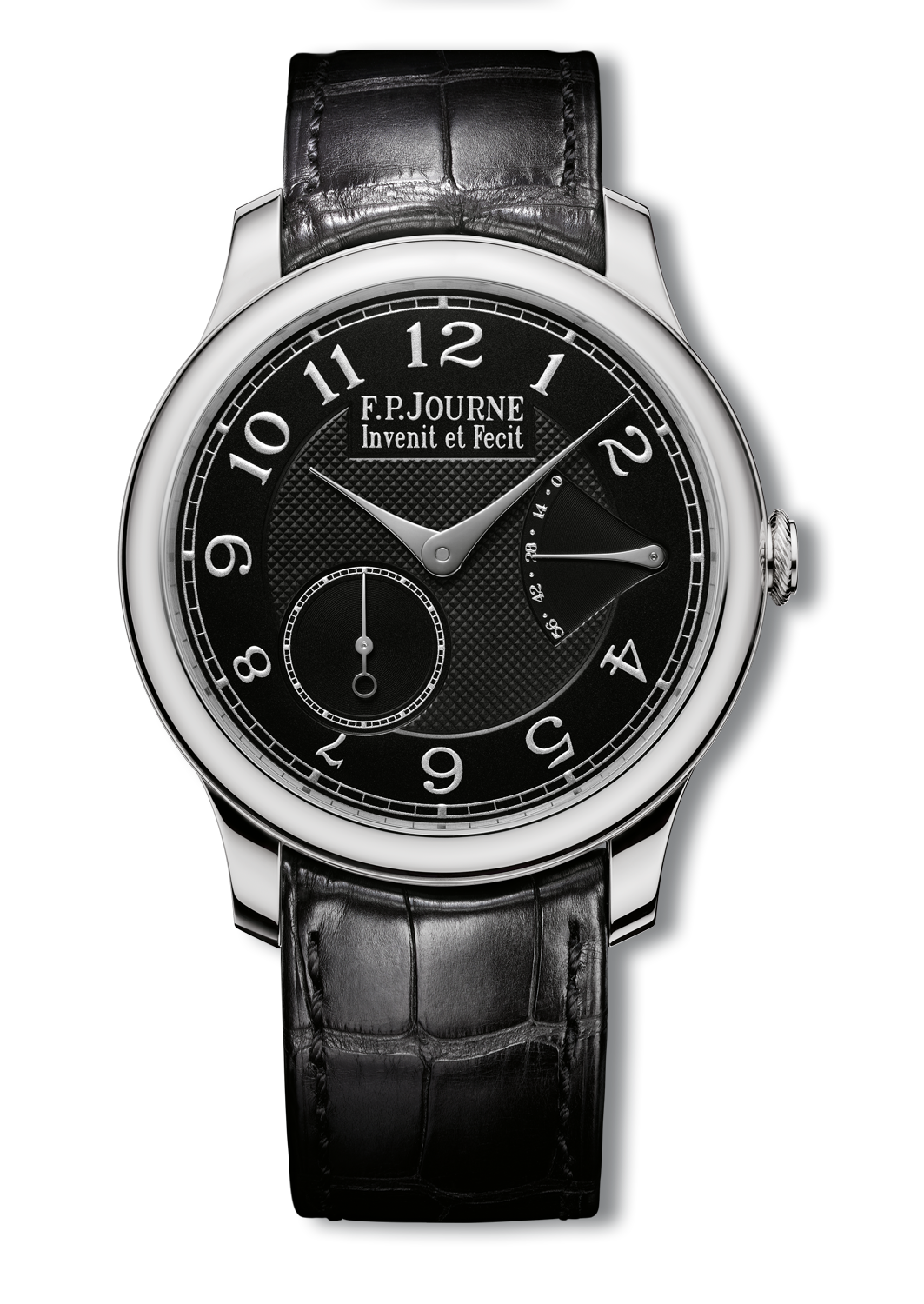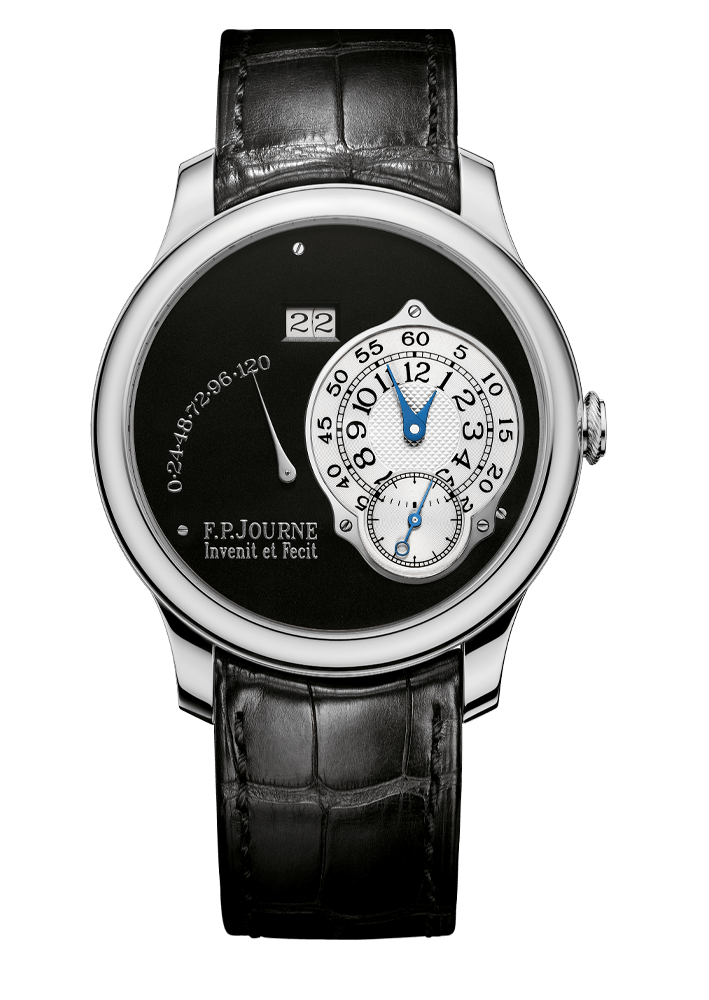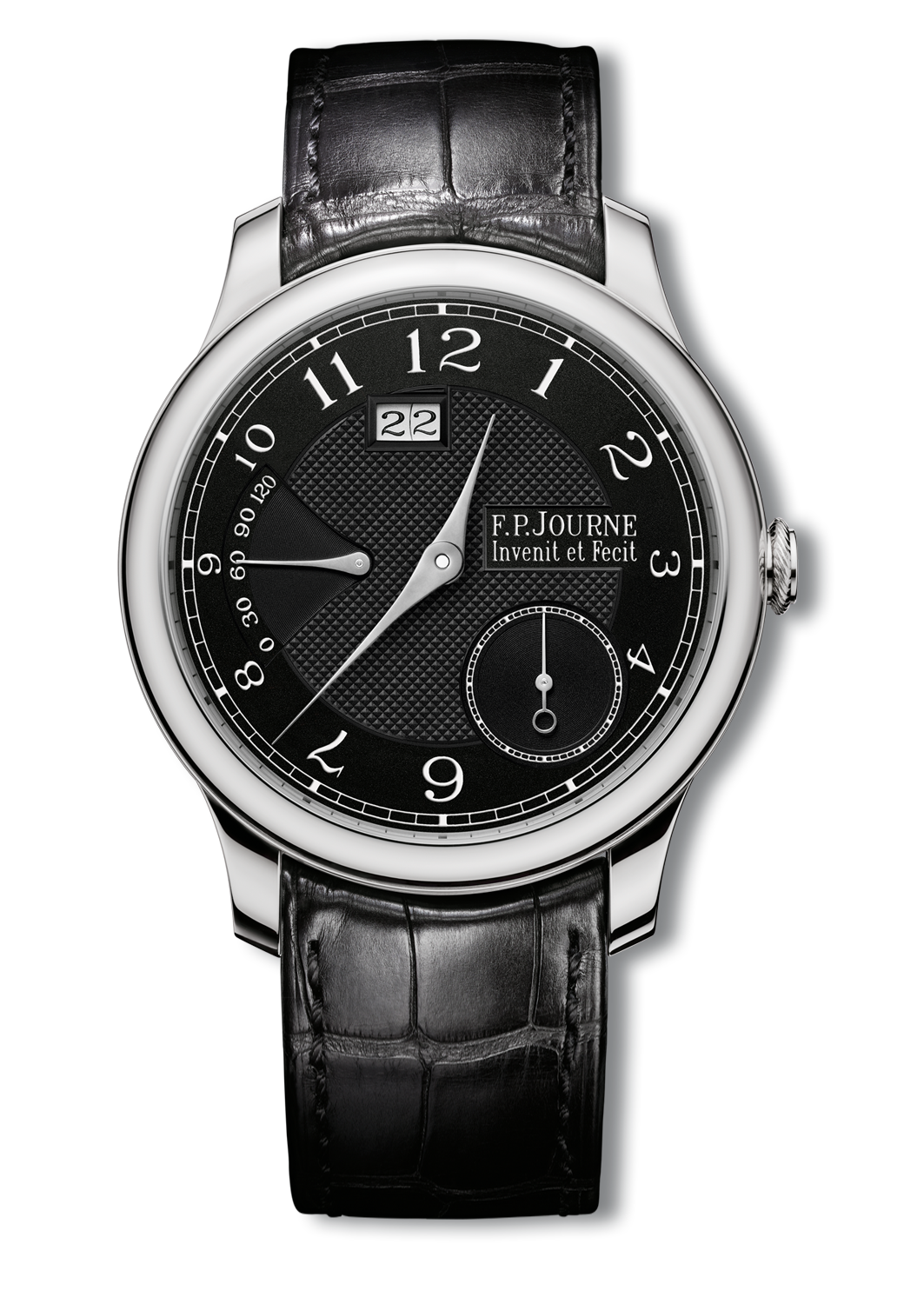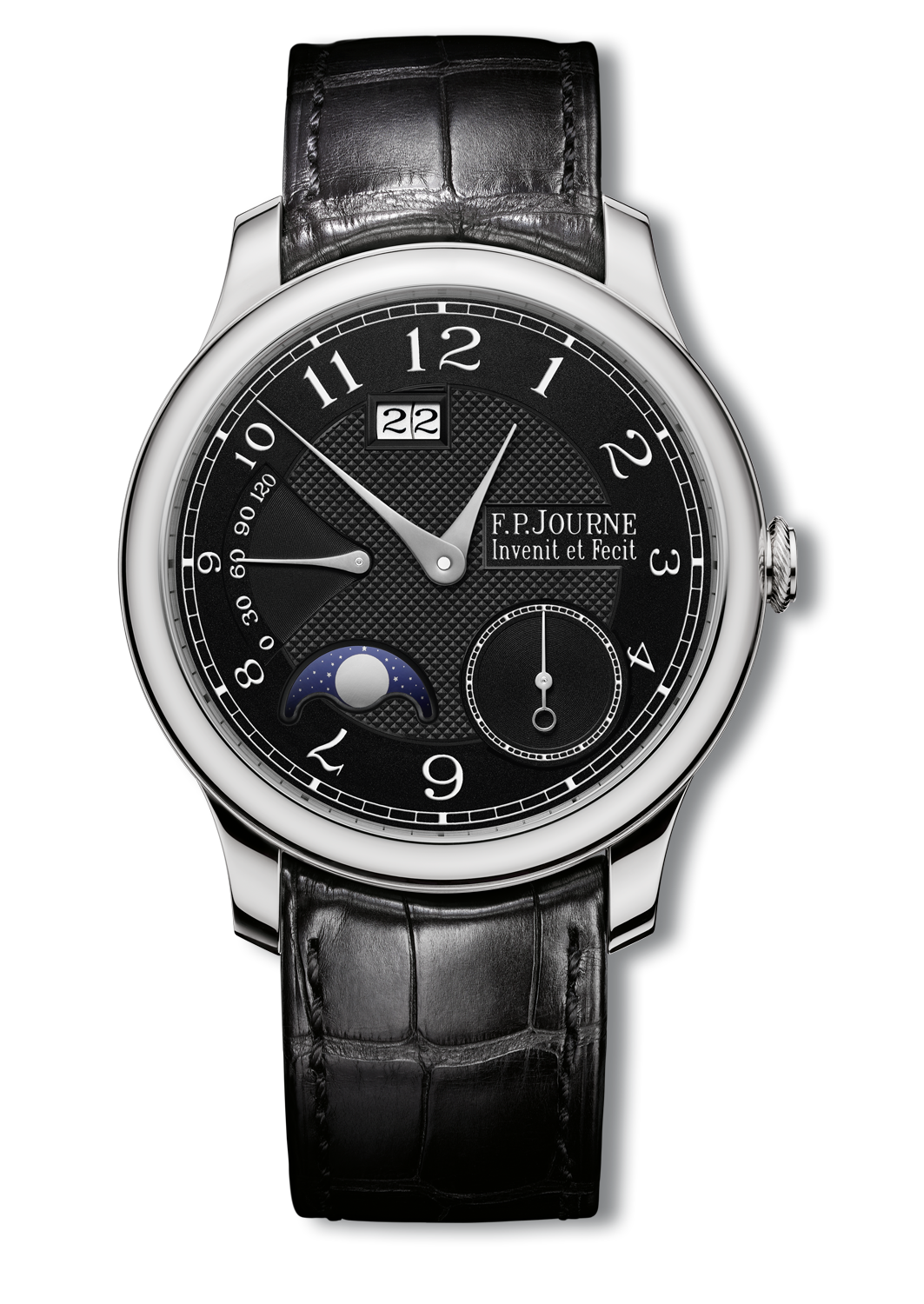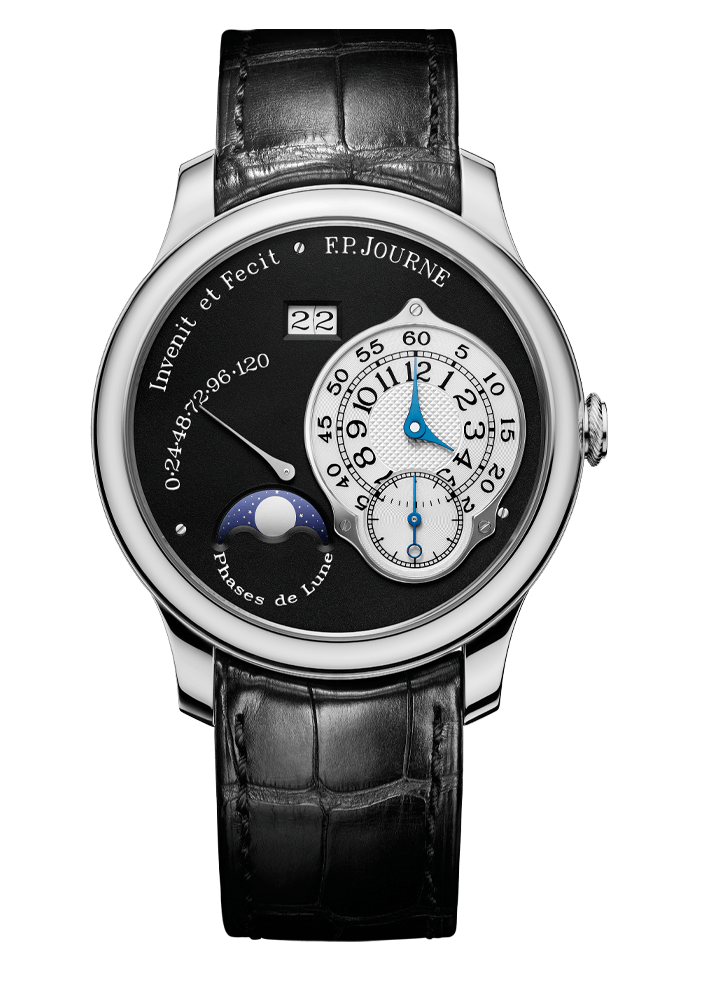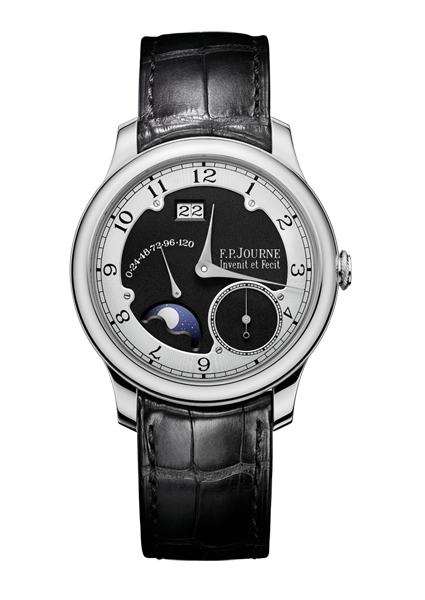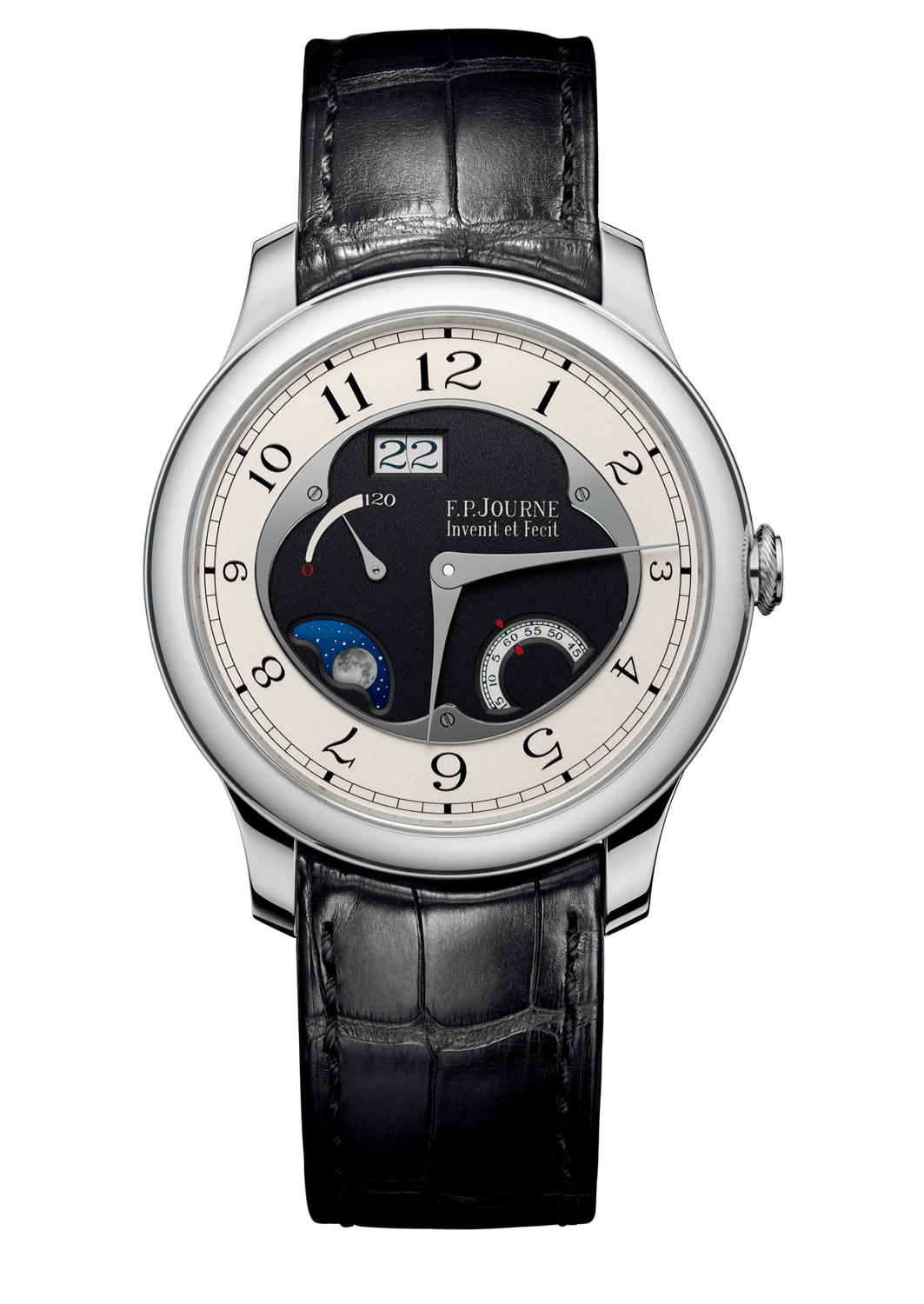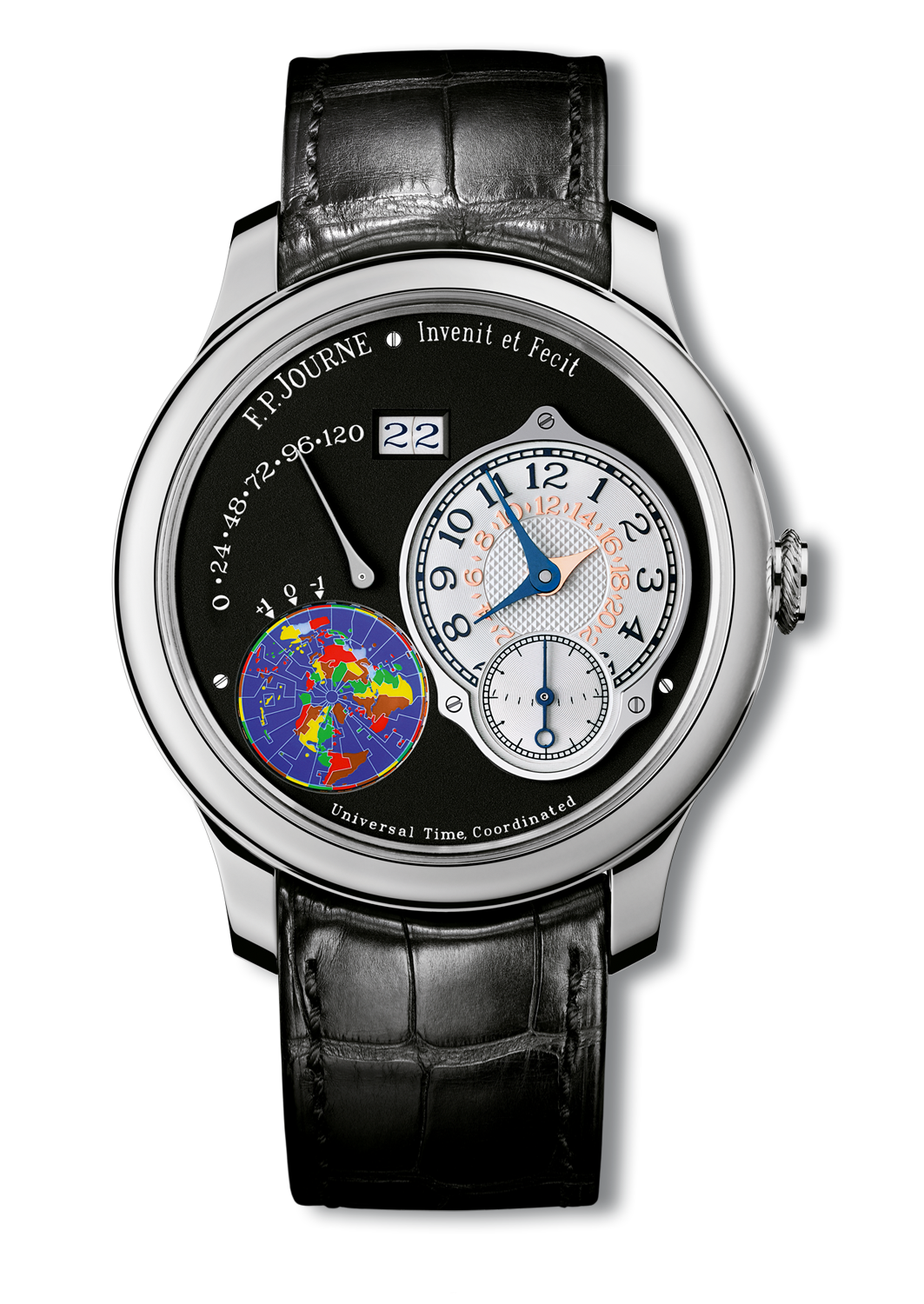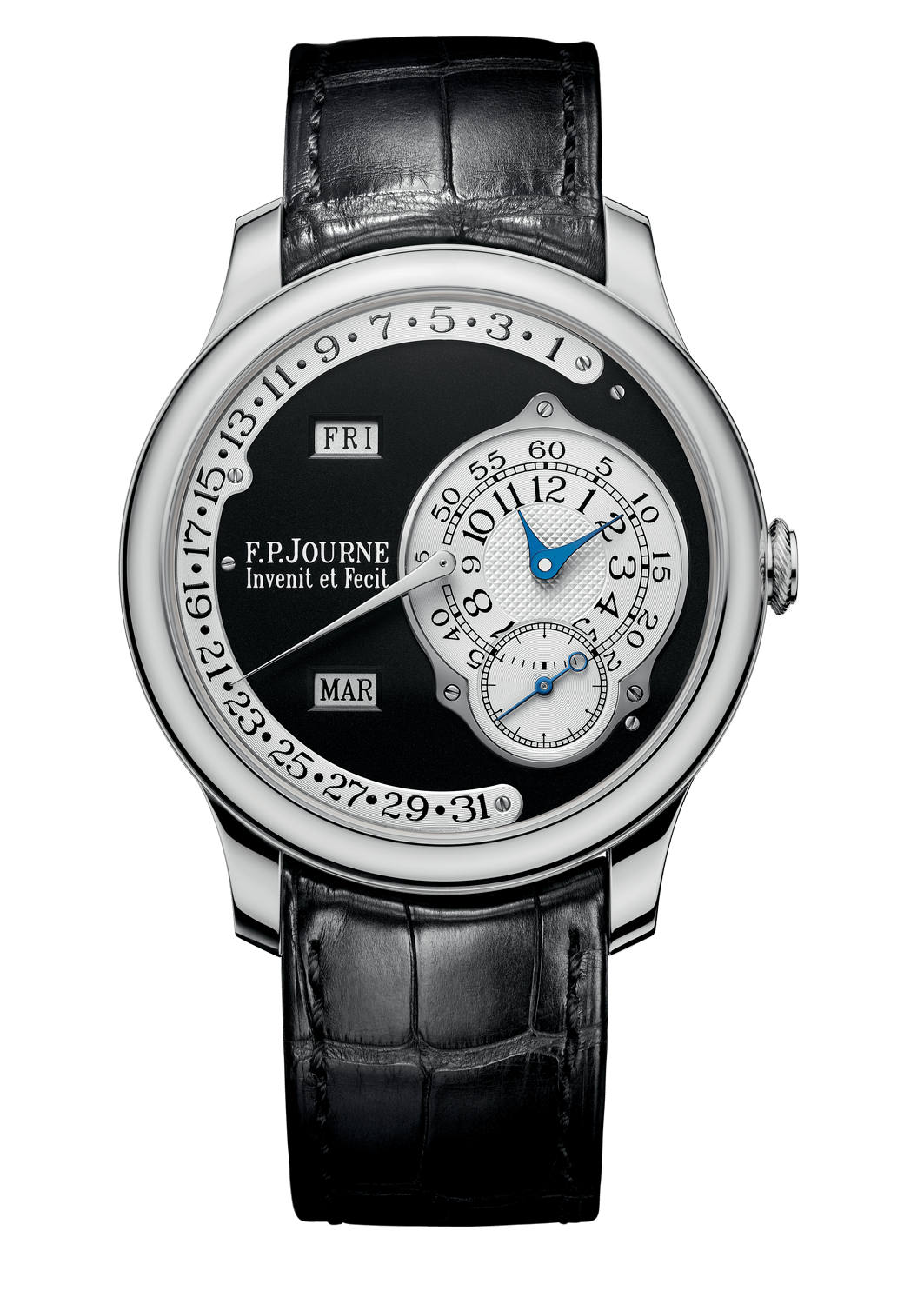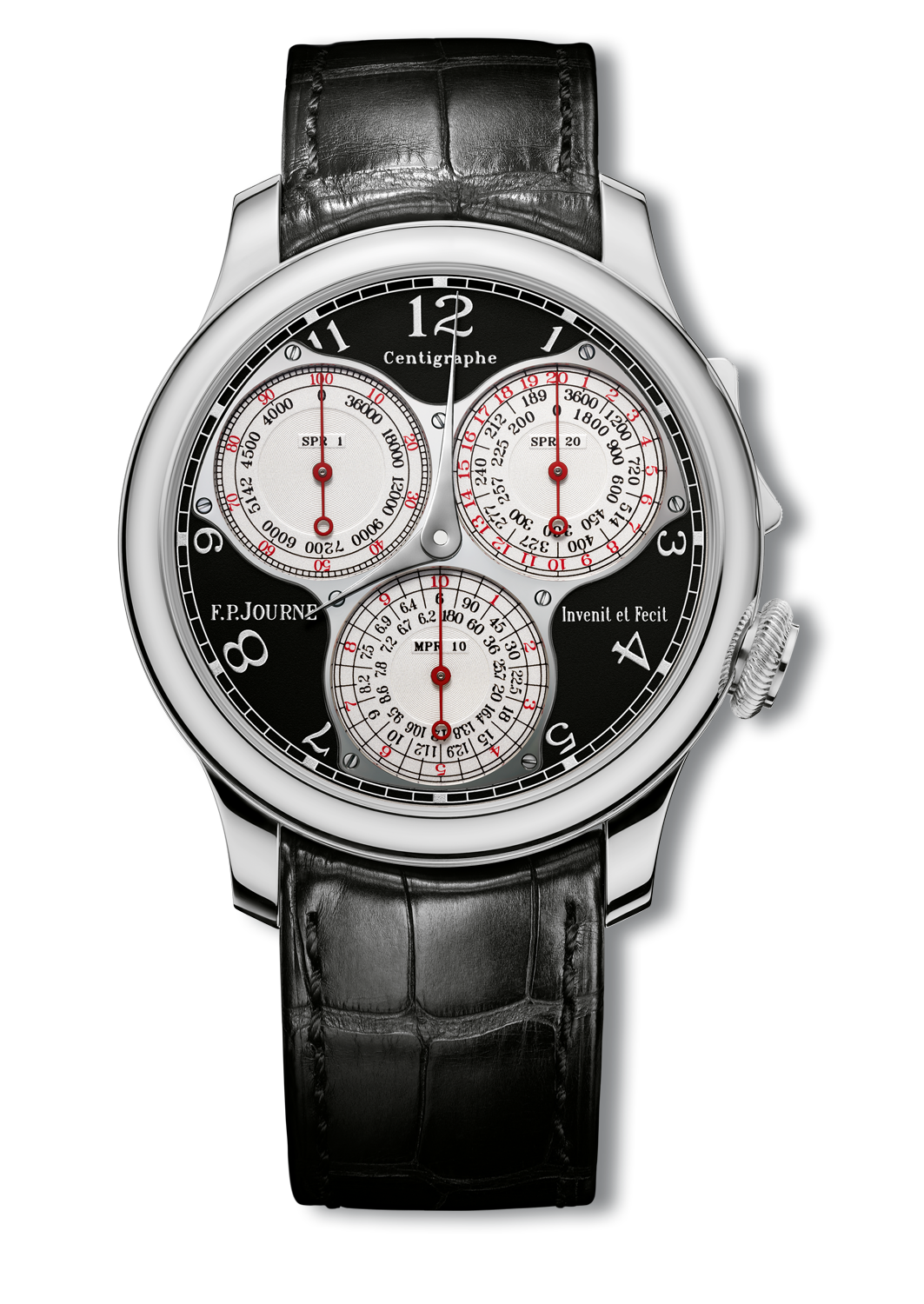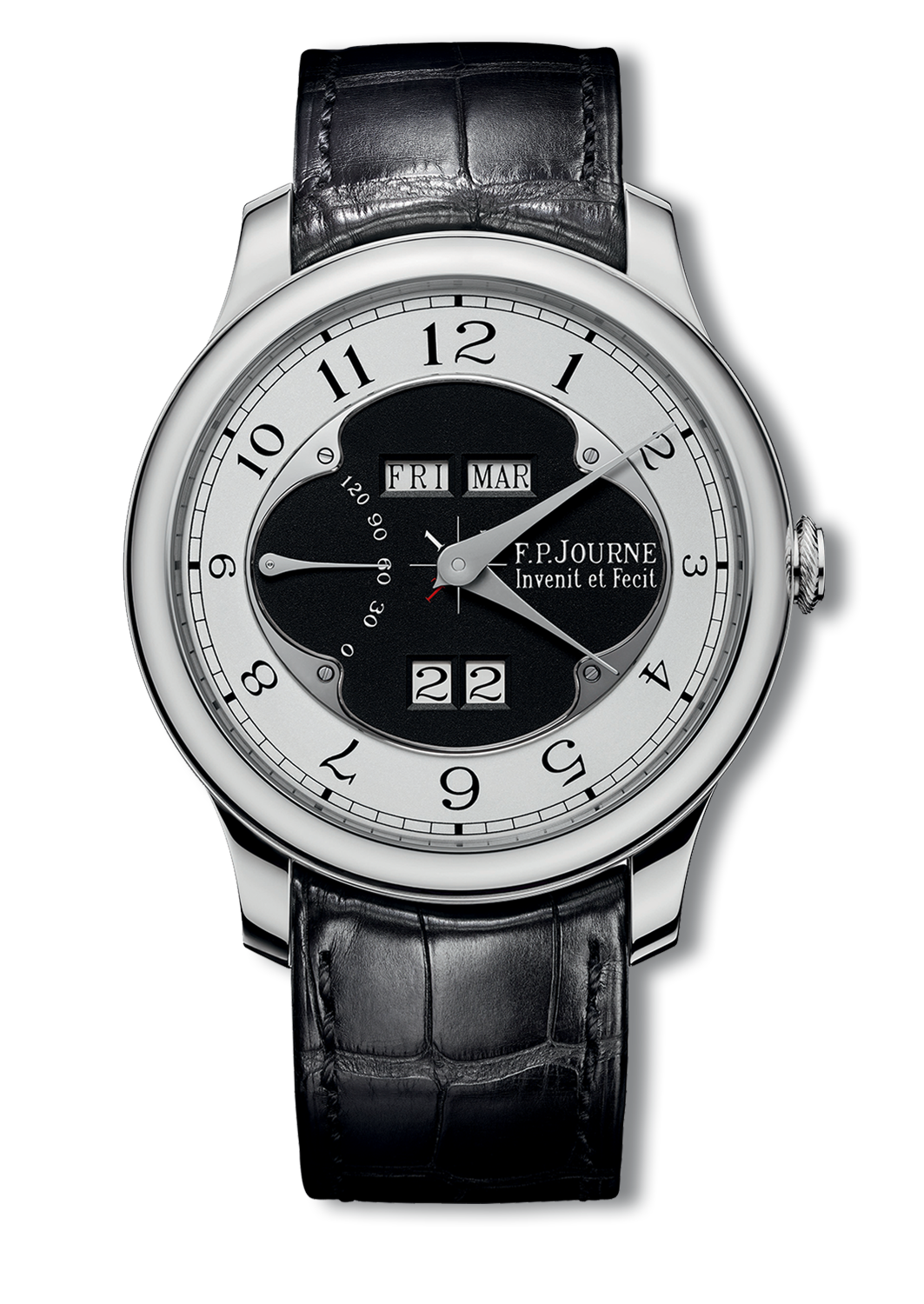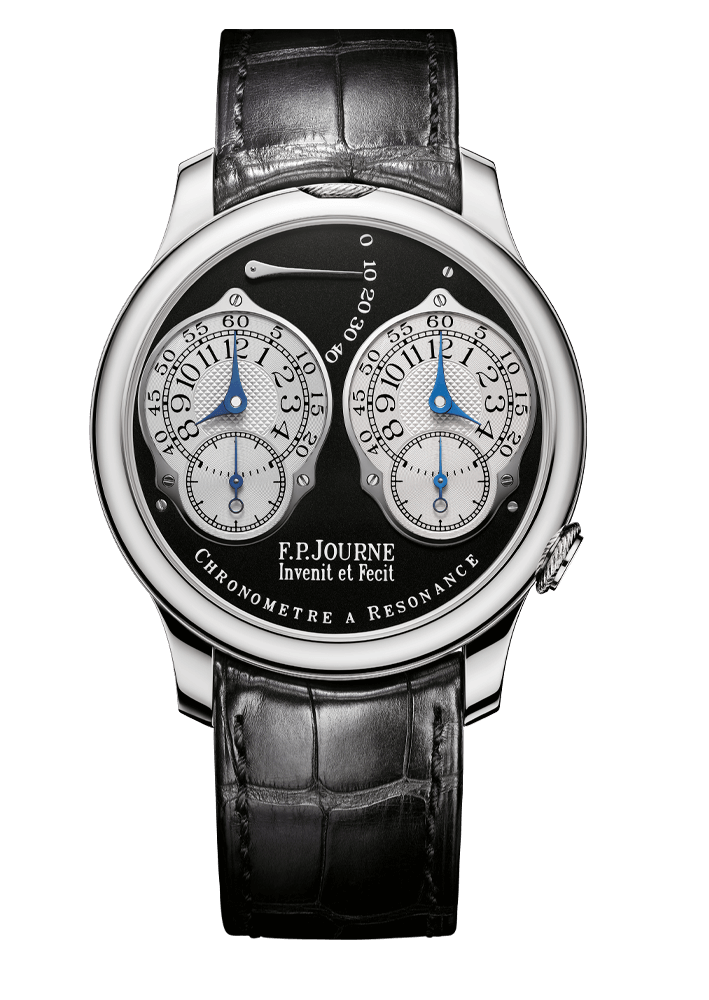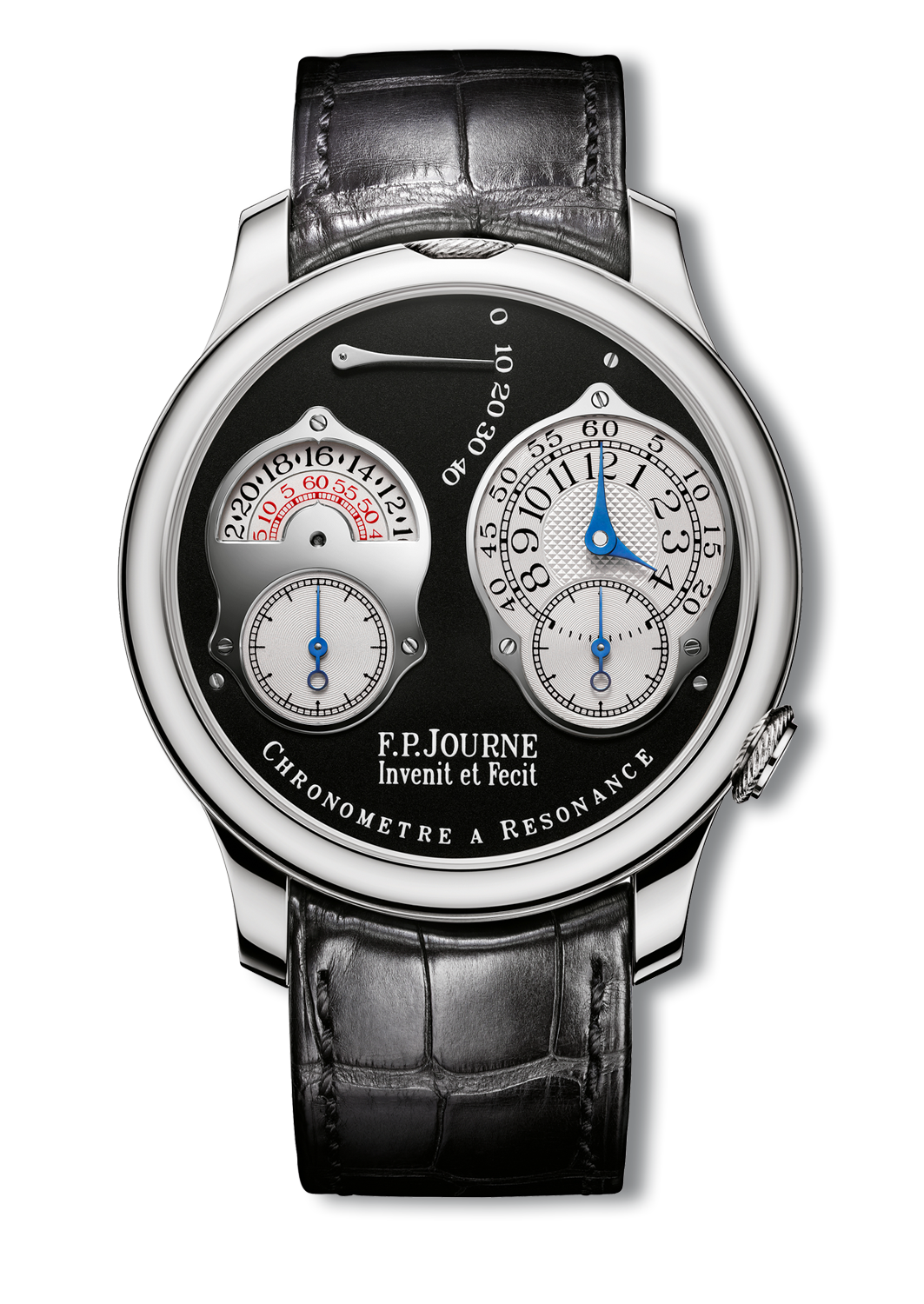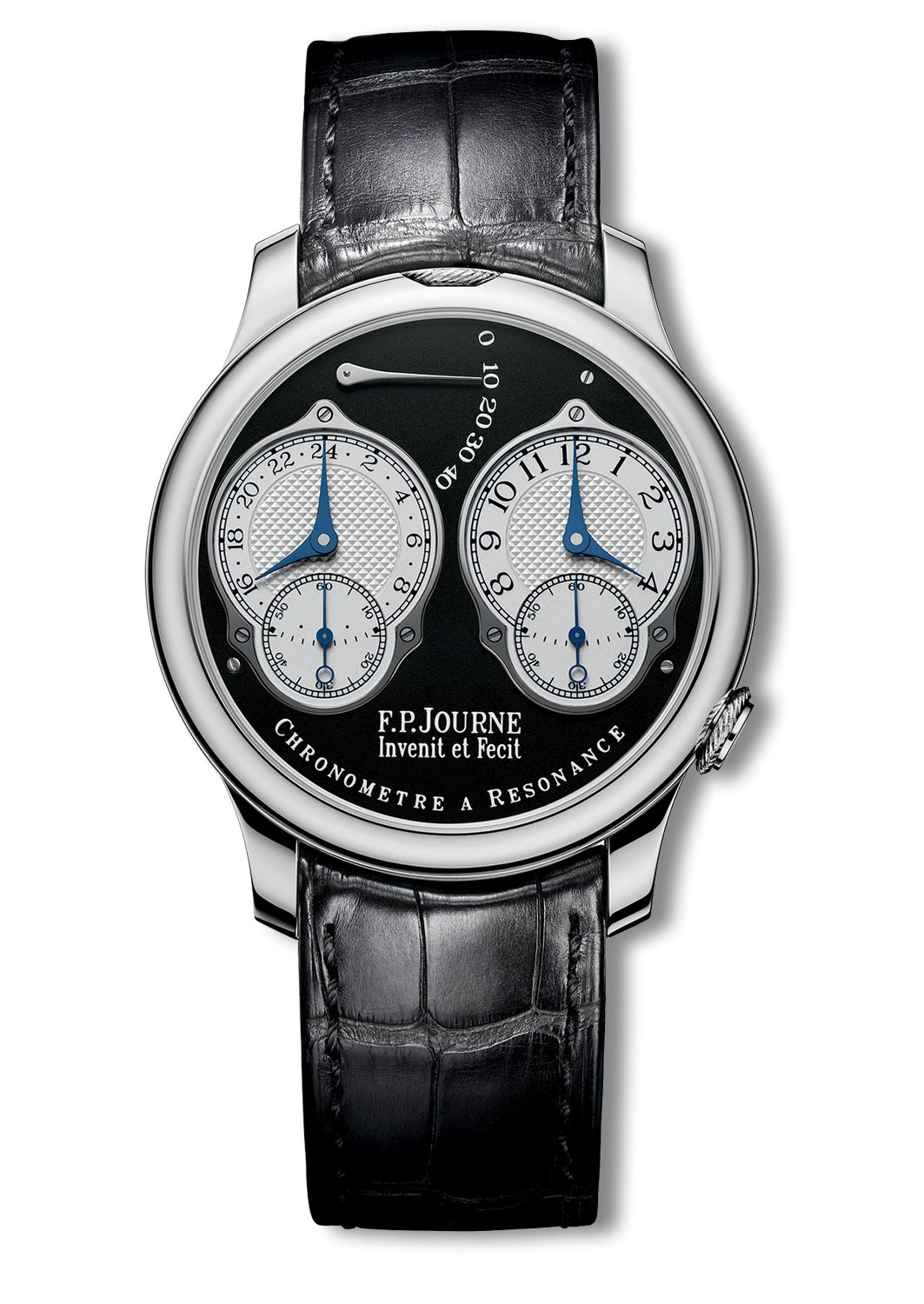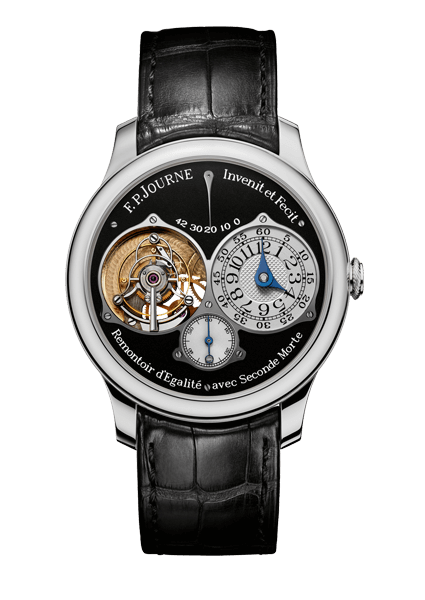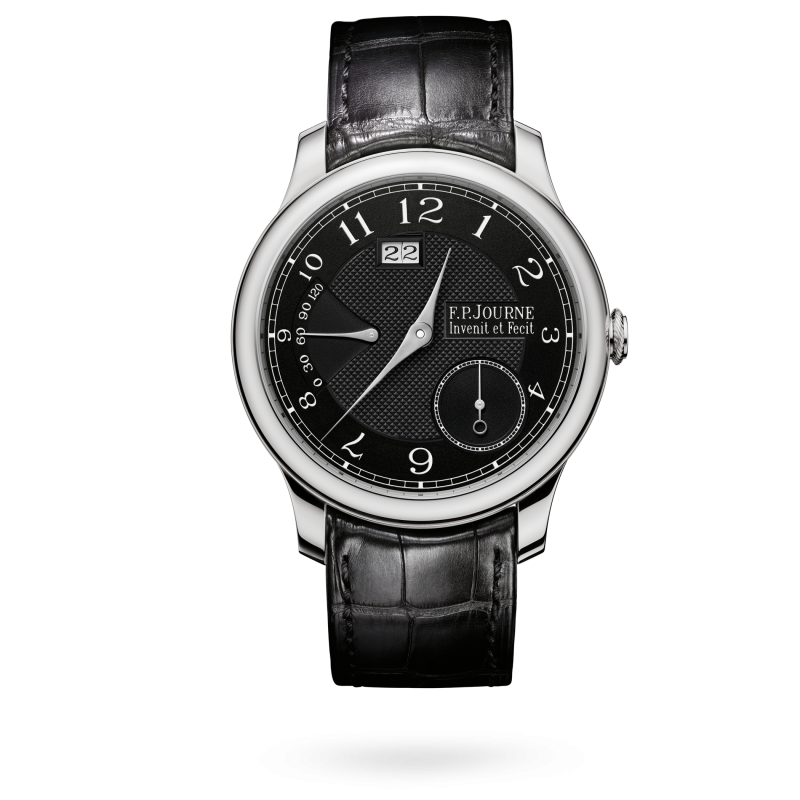Calibre 1300.3 https://www.fpjourne.com/en/collection/boutique-collection/black-label-collection-octa-automatique-reserve FP Journe https://www.fpjourne.com/en FP Journe

Dial: blackened guilloché Silver
Technical Specifications
Centre hours and minutes
Small seconds at 4:30
Large date
Power-reserve indicator at 9h00
- Overall dimensions : 30.80 mm
- Casing-up diameter : 30.40 mm
- Overall height : 5.80 mm
- Height of winding system : 3.00 mm
- Diameter of stem thread : S0.90 mm
- Case diameter : 40.00 mm
- Overall thickness case : 10.6 mm
In-line lever escapement, 15 tooth wheel
Balance with 4 inertia spring
Flat Anachron microfamed spring
Free-sprung balance
Mobile stud holder
Nivatronic laser soldered balance spring
Pinned GE stud
Three-position crown Slipping mainspring
Off-centre winding rotor
On rotator: 274 anti clock-wise rotations per 24 hours
Uni-directional automatic winding
Date setting by turning crown in opposite ways (position 2)
Time setting with crown in position 3
21'600 Alt/h, 3 Hz
Inertia: 10.10 mgcm2
Angle of lift: 52°
12 h dial up : 280°
90 h dial up : 220°
160 ± 10 hours
37
Circular stripes on the bridges
Baseplate partly circular grained
Polished screw heads with chamfered slots
Pegs with polished rounded ends
Steelwork with polished chamfers and straight graining
Movement: 259
Cased up with strap: 293
Centre hours and minutes
Small seconds at 4:30
Large date
Power-reserve indicator at 9h00
- Overall dimensions : 30.80 mm
- Casing-up diameter : 30.40 mm
- Overall height : 5.80 mm
- Height of winding system : 3.00 mm
- Diameter of stem thread : S0.90 mm
- Case diameter : 40.00 mm
- Overall thickness case : 10.6 mm
In-line lever escapement, 15 tooth wheel
Balance with 4 inertia spring
Flat Anachron microfamed spring
Free-sprung balance
Mobile stud holder
Nivatronic laser soldered balance spring
Pinned GE stud
Three-position crown Slipping mainspring
Off-centre winding rotor
On rotator: 274 anti clock-wise rotations per 24 hours
Uni-directional automatic winding
Date setting by turning crown in opposite ways (position 2)
Time setting with crown in position 3
21'600 Alt/h, 3 Hz
Inertia: 10.10 mgcm2
Angle of lift: 52°
12 h dial up : 280°
90 h dial up : 220°
160 ± 10 hours
37
Circular stripes on the bridges
Baseplate partly circular grained
Polished screw heads with chamfered slots
Pegs with polished rounded ends
Steelwork with polished chamfers and straight graining
Movement: 259
Cased up with strap: 293
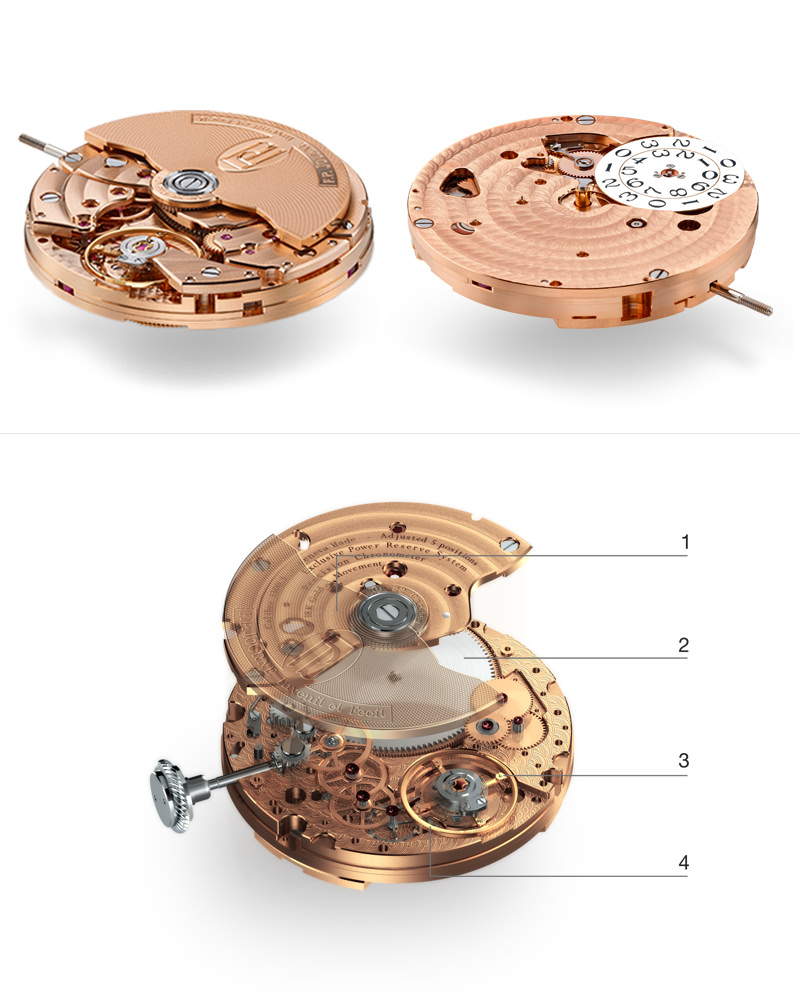
Technical description
(1) 22K Gold rotor with uni-directional winding
(2) Large capacity mainspring barrel
(3) Precision-adjustment weights
(4) Full-size free-sprung chronometer balance
Watches with long power reserves have hitherto been handicapped by small balances which are susceptible to shocks and disturbances. The Octa's compact construction allows a large (10.1 mm) balance to be fitted, giving greater inertia and stability. The free-sprung chronometer balance is adjusted by five turning weights that vibrate at a steady 21'600 times an hour.
Fully wound, the Octa delivers chronometric precision for 120 hours. The meter-long mainspring supplies an average 850gr of torque, limiting the loss in balance amplitude to 25% over the five-day period. Beyond that time, the watch will continue to go for another day or two, but the amplitude-loss no longer guarantees precision timekeeping.

Technical description
(1) 22K Gold rotor with uni-directional winding
(2) Large capacity mainspring barrel
(3) Precision-adjustment weights
(4) Full-size free-sprung chronometer balance
Watches with long power reserves have hitherto been handicapped by small balances which are susceptible to shocks and disturbances. The Octa's compact construction allows a large (10.1 mm) balance to be fitted, giving greater inertia and stability. The free-sprung chronometer balance is adjusted by five turning weights that vibrate at a steady 21'600 times an hour.
Fully wound, the Octa delivers chronometric precision for 120 hours. The meter-long mainspring supplies an average 850gr of torque, limiting the loss in balance amplitude to 25% over the five-day period. Beyond that time, the watch will continue to go for another day or two, but the amplitude-loss no longer guarantees precision timekeeping.
Dial: blackened guilloché Silver

Dial: blackened guilloché Silver
Technical Specifications
Centre hours and minutes
Small seconds at 4:30
Large date
Power-reserve indicator at 9h00
- Overall dimensions : 30.80 mm
- Casing-up diameter : 30.40 mm
- Overall height : 5.80 mm
- Height of winding system : 3.00 mm
- Diameter of stem thread : S0.90 mm
- Case diameter : 40.00 mm
- Overall thickness case : 10.6 mm
In-line lever escapement, 15 tooth wheel
Balance with 4 inertia spring
Flat Anachron microfamed spring
Free-sprung balance
Mobile stud holder
Nivatronic laser soldered balance spring
Pinned GE stud
Three-position crown Slipping mainspring
Off-centre winding rotor
On rotator: 274 anti clock-wise rotations per 24 hours
Uni-directional automatic winding
Date setting by turning crown in opposite ways (position 2)
Time setting with crown in position 3
21'600 Alt/h, 3 Hz
Inertia: 10.10 mgcm2
Angle of lift: 52°
12 h dial up : 280°
90 h dial up : 220°
160 ± 10 hours
37
Circular stripes on the bridges
Baseplate partly circular grained
Polished screw heads with chamfered slots
Pegs with polished rounded ends
Steelwork with polished chamfers and straight graining
Movement: 259
Cased up with strap: 293
Centre hours and minutes
Small seconds at 4:30
Large date
Power-reserve indicator at 9h00
- Overall dimensions : 30.80 mm
- Casing-up diameter : 30.40 mm
- Overall height : 5.80 mm
- Height of winding system : 3.00 mm
- Diameter of stem thread : S0.90 mm
- Case diameter : 40.00 mm
- Overall thickness case : 10.6 mm
In-line lever escapement, 15 tooth wheel
Balance with 4 inertia spring
Flat Anachron microfamed spring
Free-sprung balance
Mobile stud holder
Nivatronic laser soldered balance spring
Pinned GE stud
Three-position crown Slipping mainspring
Off-centre winding rotor
On rotator: 274 anti clock-wise rotations per 24 hours
Uni-directional automatic winding
Date setting by turning crown in opposite ways (position 2)
Time setting with crown in position 3
21'600 Alt/h, 3 Hz
Inertia: 10.10 mgcm2
Angle of lift: 52°
12 h dial up : 280°
90 h dial up : 220°
160 ± 10 hours
37
Circular stripes on the bridges
Baseplate partly circular grained
Polished screw heads with chamfered slots
Pegs with polished rounded ends
Steelwork with polished chamfers and straight graining
Movement: 259
Cased up with strap: 293

Technical description
(1) 22K Gold rotor with uni-directional winding
(2) Large capacity mainspring barrel
(3) Precision-adjustment weights
(4) Full-size free-sprung chronometer balance
Watches with long power reserves have hitherto been handicapped by small balances which are susceptible to shocks and disturbances. The Octa's compact construction allows a large (10.1 mm) balance to be fitted, giving greater inertia and stability. The free-sprung chronometer balance is adjusted by five turning weights that vibrate at a steady 21'600 times an hour.
Fully wound, the Octa delivers chronometric precision for 120 hours. The meter-long mainspring supplies an average 850gr of torque, limiting the loss in balance amplitude to 25% over the five-day period. Beyond that time, the watch will continue to go for another day or two, but the amplitude-loss no longer guarantees precision timekeeping.

Technical description
(1) 22K Gold rotor with uni-directional winding
(2) Large capacity mainspring barrel
(3) Precision-adjustment weights
(4) Full-size free-sprung chronometer balance
Watches with long power reserves have hitherto been handicapped by small balances which are susceptible to shocks and disturbances. The Octa's compact construction allows a large (10.1 mm) balance to be fitted, giving greater inertia and stability. The free-sprung chronometer balance is adjusted by five turning weights that vibrate at a steady 21'600 times an hour.
Fully wound, the Octa delivers chronometric precision for 120 hours. The meter-long mainspring supplies an average 850gr of torque, limiting the loss in balance amplitude to 25% over the five-day period. Beyond that time, the watch will continue to go for another day or two, but the amplitude-loss no longer guarantees precision timekeeping.
About
AN EXCLUSIVE COLLECTION AVAILABLE ONLY FOR F.P. JOURNE WATCH OWNERS.
WITH A LIMITED PRODUCTION OF ABOUT 900 TIMEPIECES PER YEAR, F.P. JOURNE WANTED TO OFFER AN EVEN MORE EXCLUSIVE TIMEKEEPER THAT WOULD BE AVAILABLE ONLY FOR OWNERS OF AN F.P. JOURNE WATCH. WITH A CASE MADE IN PLATINUM, THE MOST PRECIOUS METAL, F.P. JOURNE HAS CREATED A DISTINGUISHED LACQUERED BLACK DIAL THAT PERSONALIZES EVEN FURTHER THE ELEGANCE OF THE BRAND WATCHES. THE BLACK LABEL COLLECTION WAS BORN.
THE BLACK LABEL COLLECTION IS AVAILABLE ONLY IN THE F.P. JOURNE BOUTIQUES AND ESPACES.
A CONSTANT SEARCH FOR FUNCTIONALITY PRODUCES THE NEW OCTA 1300.3 CALIBRE. IN HIS APPROACH AS AN INNOVATIVE AND CREATIVE WATCHMAKER, FRANÇOIS-PAUL JOURNE DOES NOT HESITATE IN CONSTANTLY IMPROVING HIS CREATIONS. THIS IS THE CASE WITH THE CONCEPTION OF THIS NEW CALIBRE WHICH OFFERS AN AUTOMATIC WINDING SYSTEM IN ADEQUACY WITH THE LESS MOBILE USERS.
IN 2001, WHEN THE CREATIVE WATCHMAKER PRESENTED THE OCTA LINE - A COLLECTION OF MECHANICAL WRISTWATCH CHRONOMETERS WITH AUTOMATIC WINDING SYSTEMS OFFERING A 120-HOUR POWER RESERVE, ALL OF WHICH HAVE THE SAME CASE SIZE REGARDLESS OF THE COMPLICATION - THE SUCCESS IS IMMEDIATE!
THE OCTA COLLECTION SATISFIES A CLIENTELE LOOKING FOR AUTHENTIC, RARE AND INNOVATIVE HOROLOGY IN AN "EASY TO WEAR" MECHANICAL WRISTWATCH. THE OCTA COLLECTION IS AVAILABLE IN A VARIETY OF COMPLICATIONS SUCH AS A CHRONOGRAPH, AN ANNUAL CALENDAR OR A MOON PHASES, THUS SATISFYING A VARIETY OF CLIENTS’ NEEDS. IN HIS TESTIMONY ON THE CREATION OF HIS FIRST CALIBRE WITH AUTOMATIC MOVEMENT SIGNED F.P.JOURNE -INVENIT ET FECIT-, FRANÇOIS-PAUL JOURNE EXPLAINS HIS PHILOSOPHY, FOCUSING ON THE DIFFICULTY IN CREATING A GLOBAL COLLECTION WITH EXACTLY THE SAME SIZE CASE REGARDLESS OF THE COMPLICATION. BUT, HIS REAL CHALLENGE WAS TO PROVIDE AN ELEGANT, INNOVATIVE LINE DEVELOPED ON A CALIBRE OFFERING CHRONOMETRY AND UNRELENTING STABILITY WITH AN AUTOMATIC MOVEMENT ON A VARIABLE INERTIA BALANCE WHEEL. THE OCTA LINE WAS BORN...
OPTIMIZED WINDING SYSTEM
ALWAYS TAKING INTO ACCOUNT THE NOTES AND OBSERVATIONS CONCERNING HIS PRODUCTS, FRANÇOIS-PAUL JOURNE STATES: «I REALIZED THAT ONE OF MY FRIEND’S OCTA WAS NEVER COMPLETELY WOUND BECAUSE HE WORKS ON A COMPUTER AND HIS RIGHT HAND DOESN’T MOVE ENOUGH.»
IT IS FROM THIS OBSERVATION THAT HE CREATED THE NEW OCTA CALIBRE (1300.3) THAT USES THE SLIGHTEST MOVEMENT TO AUTOMATICALLY WIND THE WATCH. WITH TALENT, THE WATCHMAKER TURNS THE PROBLEM AROUND, AND CREATES A NEW ROTOR THAT WINDS IN ONLY ONE DIRECTION WITH A BALL BEARING SYSTEM, CONTRARY TO THE FIRST OCTA CALIBRE. THE CERAMIC BALLS ALLOW THE ROTOR TO MOVE IN ONE DIRECTION AND BLOCK IT IN THE OTHER. WHEN THE USER IS IMMOBILE, THE ROTOR GOES BACK TO ITS ORIGINAL POSITION. IN THIS WAY, EVERY INFINITESIMAL MOVEMENT IS MAXIMALLY EXPLOITED FOR AN OPTIMIZED WINDING OF THE WATCH.
THE NEW CALIBRE RETAINS THE CHARACTERISTICS OF THE CLASSIC OCTA WITH: A FIVE-DAY POWER RESERVE (120H) AND A VARIABLE INERTIA BALANCE WHEEL FOR AN OPTIMUM YIELD THAT OFFERS EACH MODEL OF THE OCTA LINE AN IRREPROACHABLE STABILITY.
ALSO IN ACCORDANCE TO HIS CLIENTS’ OBSERVATIONS, FRANÇOIS-PAUL JOURNE TAKES ADVANTAGE OF THIS NEW CALIBRE TO OFFER TWO NEW MODELS WITH CENTRAL HANDS : «SOME OF OUR CLIENTS TOLD ME THEY HAD DIFFICULTY READING THE TIME ON THE CLASSICAL OCTA DIAL, SO I TOOK ADVANTAGE OF THE NEW CALIBRE’S CREATION TO BUILD THE OCTA AUTOMATIC RESERVE AND THE OCTA AUTOMATIC LUNE WHOSE DIALS ARE INSPIRED BY THAT OF THE CHONOMÈTRE SOUVERAIN - WATCH THAT WON THE GENEVA WATCHMAKING GRAND PRIX IN 2005 IN THE MEN’S WATCH CATEGORY».
A HOROLOGICAL IDEAL
“THE CONSTRUCTION OF THE OCTA CALIBRE HAS LESS POWERFUL TIES WITH HOROLOGICAL HISTORY THAN DO THE CONSTANT-FORCE DEVICE OR RESONANCE MODELS, BUT IT SYMBOLISES AN HOROLOGICAL IDEAL OF GIVING TIMEKEEPERS THE HIGHEST POSSIBLE DEGREE OF PRECISION AND AUTONOMY!
ONE CAN INDEED NOTE THE FACT THAT IF CHURCH CLOCKS ARE PLACED SO HIGH, IN ADDITION TO ENHANCING VISIBILITY, IT WAS MOSTLY BECAUSE IT OFTEN TOOK AN ENTIRE MONTH FOR THE DRIVING-WEIGHTS TO DROP THE LENGTH OF THEIR CORDS. NUMEROUS SYSTEMS WERE INVENTED TO INCREASE THE OPERATING DURATION OF TIMEKEEPING DEVICES, MEETING WITH VARIOUS DEGREES OF SUCCESS. GIVEN THE SMALL VOLUME OF A WRISTWATCH, THE SIZE OF THE MAINSPRING WAS AUTOMATICALLY LIMITED. WATCHMAKERS THEREFORE DISCOVERED THE TRICK OF ADDING AN EXTRA WHEEL TO THE CUSTOMARY GEARTRAIN IN ORDER TO EXTEND THE DURATION OF ITS DEVELOPMENT. UNFORTUNATELY, ACTUALLY USING THIS SYSTEM, EVEN WITH A STRONGER SPRING, LED THEM TO OBSERVE THAT THE LEVEL OF ENERGY ACTUALLY REACHING THE BALANCE REMAINED LOW. TO COMPENSATE FOR THIS, THEY FITTED A SMALLER BALANCE USING LESS ENERGY, BUT WHICH WAS ALSO LESS STABLE. IT IS THEREFORE NOT UNUSUAL TO FIND THAT SOME WATCHES ABLE TO RUN FOR SEVERAL DAYS DISPLAY AN EXTREMELY UNPREDICTABLE LEVEL OF PRECISION.
THIS CHALLENGE WAS A POWERFUL SOURCE OF MOTIVATION! I THEN IMAGINED THAT THE BEST AND THE MOST OBVIOUS MEANS OF EXTENDING THE RUNNING DURATION WOULD BE TO EXTEND THE CAPACITY OF THE SPRING DEVELOPMENT. THE DIFFICULTY LAY IN INTEGRATING IT ON THE SAME LEVEL AS THE GEAR-TRAIN AND THE ESCAPEMENT, GIVEN ITS STABILITY: 1 METRE AND 1 MILLIMETRE THICK. THANKS TO THE LOW TORQUE OF THIS SPRING, I COULD ACHIEVE EXTREMELY FAST AUTOMATIC WINDING (ONE AND A HALF HOURS ON A CHAPPUIS CYCLOTEST FOR OVER 5 DAYS’ RUNNING).
ONCE THE CHALLENGE OF AUTONOMY WAS THUS SUCCESSFULLY MET WITH THIS AUTOMATIC WINDING CALIBRE, I KNUCKLED DOWN TO THE SECOND CHALLENGE OF MANAGING TO INSERT VARIOUS COMPLICATIONS INTO THAT SAME MOVEMENT: POWER RESERVE WITH LARGE DATE DISPLAY, FLY-BACK CHRONOGRAPH WITH LARGE DATE DISPLAY, RETROGRADE ANNUAL CALENDAR, ETC… AND OF DOING SO WHILE MAINTAINING AN IDENTICAL SIZE FOR ALL MODELS.
THREE YEARS OF RESEARCH AND DEVELOPMENT WERE REQUIRED BEFORE THIS AUTOMATIC WINDING MOVEMENT THAT IS UNIQUE IN THE WORLD COULD BE PRESENTED TO THE PUBLIC.”
FRANÇOIS-PAUL JOURNE
Technical Specifications
Centre hours and minutes
Small seconds at 4:30
Large date
Power-reserve indicator at 9h00
- Overall dimensions : 30.80 mm
- Casing-up diameter : 30.40 mm
- Overall height : 5.80 mm
- Height of winding system : 3.00 mm
- Diameter of stem thread : S0.90 mm
- Case diameter : 40.00 mm
- Overall thickness case : 10.6 mm
In-line lever escapement, 15 tooth wheel
Balance with 4 inertia spring
Flat Anachron microfamed spring
Free-sprung balance
Mobile stud holder
Nivatronic laser soldered balance spring
Pinned GE stud
Three-position crown Slipping mainspring
Off-centre winding rotor
On rotator: 274 anti clock-wise rotations per 24 hours
Uni-directional automatic winding
Date setting by turning crown in opposite ways (position 2)
Time setting with crown in position 3
21'600 Alt/h, 3 Hz
Inertia: 10.10 mgcm2
Angle of lift: 52°
12 h dial up : 280°
90 h dial up : 220°
160 ± 10 hours
37
Circular stripes on the bridges
Baseplate partly circular grained
Polished screw heads with chamfered slots
Pegs with polished rounded ends
Steelwork with polished chamfers and straight graining
Movement: 259
Cased up with strap: 293
Centre hours and minutes
Small seconds at 4:30
Large date
Power-reserve indicator at 9h00
- Overall dimensions : 30.80 mm
- Casing-up diameter : 30.40 mm
- Overall height : 5.80 mm
- Height of winding system : 3.00 mm
- Diameter of stem thread : S0.90 mm
- Case diameter : 40.00 mm
- Overall thickness case : 10.6 mm
In-line lever escapement, 15 tooth wheel
Balance with 4 inertia spring
Flat Anachron microfamed spring
Free-sprung balance
Mobile stud holder
Nivatronic laser soldered balance spring
Pinned GE stud
Three-position crown Slipping mainspring
Off-centre winding rotor
On rotator: 274 anti clock-wise rotations per 24 hours
Uni-directional automatic winding
Date setting by turning crown in opposite ways (position 2)
Time setting with crown in position 3
21'600 Alt/h, 3 Hz
Inertia: 10.10 mgcm2
Angle of lift: 52°
12 h dial up : 280°
90 h dial up : 220°
160 ± 10 hours
37
Circular stripes on the bridges
Baseplate partly circular grained
Polished screw heads with chamfered slots
Pegs with polished rounded ends
Steelwork with polished chamfers and straight graining
Movement: 259
Cased up with strap: 293

Technical description
(1) 22K Gold rotor with uni-directional winding
(2) Large capacity mainspring barrel
(3) Precision-adjustment weights
(4) Full-size free-sprung chronometer balance
Watches with long power reserves have hitherto been handicapped by small balances which are susceptible to shocks and disturbances. The Octa's compact construction allows a large (10.1 mm) balance to be fitted, giving greater inertia and stability. The free-sprung chronometer balance is adjusted by five turning weights that vibrate at a steady 21'600 times an hour.
Fully wound, the Octa delivers chronometric precision for 120 hours. The meter-long mainspring supplies an average 850gr of torque, limiting the loss in balance amplitude to 25% over the five-day period. Beyond that time, the watch will continue to go for another day or two, but the amplitude-loss no longer guarantees precision timekeeping.

Technical description
(1) 22K Gold rotor with uni-directional winding
(2) Large capacity mainspring barrel
(3) Precision-adjustment weights
(4) Full-size free-sprung chronometer balance
Watches with long power reserves have hitherto been handicapped by small balances which are susceptible to shocks and disturbances. The Octa's compact construction allows a large (10.1 mm) balance to be fitted, giving greater inertia and stability. The free-sprung chronometer balance is adjusted by five turning weights that vibrate at a steady 21'600 times an hour.
Fully wound, the Octa delivers chronometric precision for 120 hours. The meter-long mainspring supplies an average 850gr of torque, limiting the loss in balance amplitude to 25% over the five-day period. Beyond that time, the watch will continue to go for another day or two, but the amplitude-loss no longer guarantees precision timekeeping.
-
About
THIS MODEL WAS PRODUCED BETWEEN 2007 AND 2013.
AN EXCLUSIVE COLLECTION AVAILABLE ONLY FOR F.P. JOURNE WATCH OWNERS.
WITH A LIMITED PRODUCTION OF ABOUT 900 TIMEPIECES PER YEAR, F.P. JOURNE WANTED TO OFFER AN EVEN MORE EXCLUSIVE TIMEKEEPER THAT WOULD BE AVAILABLE ONLY FOR OWNERS OF AN F.P. JOURNE WATCH. WITH A CASE MADE IN PLATINUM, THE MOST PRECIOUS METAL, F.P. JOURNE HAS CREATED A DISTINGUISHED LACQUERED BLACK DIAL THAT PERSONALIZES EVEN FURTHER THE ELEGANCE OF THE BRAND WATCHES. THE BLACK LABEL COLLECTION WAS BORN.
THE BLACK LABEL COLLECTION IS AVAILABLE ONLY IN THE F.P. JOURNE BOUTIQUES AND ESPACES.
A CONSTANT SEARCH FOR FUNCTIONALITY PRODUCES THE NEW OCTA 1300.3 CALIBRE. IN HIS APPROACH AS AN INNOVATIVE AND CREATIVE WATCHMAKER, FRANÇOIS-PAUL JOURNE DOES NOT HESITATE IN CONSTANTLY IMPROVING HIS CREATIONS. THIS IS THE CASE WITH THE CONCEPTION OF THIS NEW CALIBRE WHICH OFFERS AN AUTOMATIC WINDING SYSTEM IN ADEQUACY WITH THE LESS MOBILE USERS.
IN 2001, WHEN THE CREATIVE WATCHMAKER PRESENTED THE OCTA LINE - A COLLECTION OF MECHANICAL WRISTWATCH CHRONOMETERS WITH AUTOMATIC WINDING SYSTEMS OFFERING A 120-HOUR POWER RESERVE, ALL OF WHICH HAVE THE SAME CASE SIZE REGARDLESS OF THE COMPLICATION - THE SUCCESS IS IMMEDIATE!
THE OCTA COLLECTION SATISFIES A CLIENTELE LOOKING FOR AUTHENTIC, RARE AND INNOVATIVE HOROLOGY IN AN "EASY TO WEAR" MECHANICAL WRISTWATCH. THE OCTA COLLECTION IS AVAILABLE IN A VARIETY OF COMPLICATIONS SUCH AS A CHRONOGRAPH, AN ANNUAL CALENDAR OR A MOON PHASES, THUS SATISFYING A VARIETY OF CLIENTS’ NEEDS. IN HIS TESTIMONY ON THE CREATION OF HIS FIRST CALIBRE WITH AUTOMATIC MOVEMENT SIGNED F.P.JOURNE -INVENIT ET FECIT-, FRANÇOIS-PAUL JOURNE EXPLAINS HIS PHILOSOPHY, FOCUSING ON THE DIFFICULTY IN CREATING A GLOBAL COLLECTION WITH EXACTLY THE SAME SIZE CASE REGARDLESS OF THE COMPLICATION. BUT, HIS REAL CHALLENGE WAS TO PROVIDE AN ELEGANT, INNOVATIVE LINE DEVELOPED ON A CALIBRE OFFERING CHRONOMETRY AND UNRELENTING STABILITY WITH AN AUTOMATIC MOVEMENT ON A VARIABLE INERTIA BALANCE WHEEL. THE OCTA LINE WAS BORN...
OPTIMIZED WINDING SYSTEM
ALWAYS TAKING INTO ACCOUNT THE NOTES AND OBSERVATIONS CONCERNING HIS PRODUCTS, FRANÇOIS-PAUL JOURNE STATES: «I REALIZED THAT ONE OF MY FRIEND’S OCTA WAS NEVER COMPLETELY WOUND BECAUSE HE WORKS ON A COMPUTER AND HIS RIGHT HAND DOESN’T MOVE ENOUGH.»
IT IS FROM THIS OBSERVATION THAT HE CREATED THE NEW OCTA CALIBRE (1300.3) THAT USES THE SLIGHTEST MOVEMENT TO AUTOMATICALLY WIND THE WATCH. WITH TALENT, THE WATCHMAKER TURNS THE PROBLEM AROUND, AND CREATES A NEW ROTOR THAT WINDS IN ONLY ONE DIRECTION WITH A BALL BEARING SYSTEM, CONTRARY TO THE FIRST OCTA CALIBRE. THE CERAMIC BALLS ALLOW THE ROTOR TO MOVE IN ONE DIRECTION AND BLOCK IT IN THE OTHER. WHEN THE USER IS IMMOBILE, THE ROTOR GOES BACK TO ITS ORIGINAL POSITION. IN THIS WAY, EVERY INFINITESIMAL MOVEMENT IS MAXIMALLY EXPLOITED FOR AN OPTIMIZED WINDING OF THE WATCH.
THE NEW CALIBRE RETAINS THE CHARACTERISTICS OF THE CLASSIC OCTA WITH: A FIVE-DAY POWER RESERVE (120H) AND A VARIABLE INERTIA BALANCE WHEEL FOR AN OPTIMUM YIELD THAT OFFERS EACH MODEL OF THE OCTA LINE AN IRREPROACHABLE STABILITY.
ALSO IN ACCORDANCE TO HIS CLIENTS’ OBSERVATIONS, FRANÇOIS-PAUL JOURNE TAKES ADVANTAGE OF THIS NEW CALIBRE TO OFFER TWO NEW MODELS WITH CENTRAL HANDS : «SOME OF OUR CLIENTS TOLD ME THEY HAD DIFFICULTY READING THE TIME ON THE CLASSICAL OCTA DIAL, SO I TOOK ADVANTAGE OF THE NEW CALIBRE’S CREATION TO BUILD THE OCTA AUTOMATIC RESERVE AND THE OCTA AUTOMATIC LUNE WHOSE DIALS ARE INSPIRED BY THAT OF THE CHONOMÈTRE SOUVERAIN - WATCH THAT WON THE GENEVA WATCHMAKING GRAND PRIX IN 2005 IN THE MEN’S WATCH CATEGORY». -
Testimony
CALIBRE OCTA
A HOROLOGICAL IDEAL
“THE CONSTRUCTION OF THE OCTA CALIBRE HAS LESS POWERFUL TIES WITH HOROLOGICAL HISTORY THAN DO THE CONSTANT-FORCE DEVICE OR RESONANCE MODELS, BUT IT SYMBOLISES AN HOROLOGICAL IDEAL OF GIVING TIMEKEEPERS THE HIGHEST POSSIBLE DEGREE OF PRECISION AND AUTONOMY!
ONE CAN INDEED NOTE THE FACT THAT IF CHURCH CLOCKS ARE PLACED SO HIGH, IN ADDITION TO ENHANCING VISIBILITY, IT WAS MOSTLY BECAUSE IT OFTEN TOOK AN ENTIRE MONTH FOR THE DRIVING-WEIGHTS TO DROP THE LENGTH OF THEIR CORDS. NUMEROUS SYSTEMS WERE INVENTED TO INCREASE THE OPERATING DURATION OF TIMEKEEPING DEVICES, MEETING WITH VARIOUS DEGREES OF SUCCESS. GIVEN THE SMALL VOLUME OF A WRISTWATCH, THE SIZE OF THE MAINSPRING WAS AUTOMATICALLY LIMITED. WATCHMAKERS THEREFORE DISCOVERED THE TRICK OF ADDING AN EXTRA WHEEL TO THE CUSTOMARY GEARTRAIN IN ORDER TO EXTEND THE DURATION OF ITS DEVELOPMENT. UNFORTUNATELY, ACTUALLY USING THIS SYSTEM, EVEN WITH A STRONGER SPRING, LED THEM TO OBSERVE THAT THE LEVEL OF ENERGY ACTUALLY REACHING THE BALANCE REMAINED LOW. TO COMPENSATE FOR THIS, THEY FITTED A SMALLER BALANCE USING LESS ENERGY, BUT WHICH WAS ALSO LESS STABLE. IT IS THEREFORE NOT UNUSUAL TO FIND THAT SOME WATCHES ABLE TO RUN FOR SEVERAL DAYS DISPLAY AN EXTREMELY UNPREDICTABLE LEVEL OF PRECISION.
THIS CHALLENGE WAS A POWERFUL SOURCE OF MOTIVATION! I THEN IMAGINED THAT THE BEST AND THE MOST OBVIOUS MEANS OF EXTENDING THE RUNNING DURATION WOULD BE TO EXTEND THE CAPACITY OF THE SPRING DEVELOPMENT. THE DIFFICULTY LAY IN INTEGRATING IT ON THE SAME LEVEL AS THE GEAR-TRAIN AND THE ESCAPEMENT, GIVEN ITS STABILITY: 1 METRE AND 1 MILLIMETRE THICK. THANKS TO THE LOW TORQUE OF THIS SPRING, I COULD ACHIEVE EXTREMELY FAST AUTOMATIC WINDING (ONE AND A HALF HOURS ON A CHAPPUIS CYCLOTEST FOR OVER 5 DAYS’ RUNNING).
ONCE THE CHALLENGE OF AUTONOMY WAS THUS SUCCESSFULLY MET WITH THIS AUTOMATIC WINDING CALIBRE, I KNUCKLED DOWN TO THE SECOND CHALLENGE OF MANAGING TO INSERT VARIOUS COMPLICATIONS INTO THAT SAME MOVEMENT: POWER RESERVE WITH LARGE DATE DISPLAY, FLY-BACK CHRONOGRAPH WITH LARGE DATE DISPLAY, RETROGRADE ANNUAL CALENDAR, ETC… AND OF DOING SO WHILE MAINTAINING AN IDENTICAL SIZE FOR ALL MODELS.
THREE YEARS OF RESEARCH AND DEVELOPMENT WERE REQUIRED BEFORE THIS AUTOMATIC WINDING MOVEMENT THAT IS UNIQUE IN THE WORLD COULD BE PRESENTED TO THE PUBLIC.”
FRANÇOIS-PAUL JOURNE -
Technical description
Technical Specifications
Indications :Centre hours and minutes
Small seconds at 4:30
Large date
Power-reserve indicator at 9h00Dimensions :- Overall dimensions : 30.80 mm
- Casing-up diameter : 30.40 mm
- Overall height : 5.80 mm
- Height of winding system : 3.00 mm
- Diameter of stem thread : S0.90 mm
- Case diameter : 40.00 mm
- Overall thickness case : 10.6 mm
Characteristics :In-line lever escapement, 15 tooth wheel
Balance with 4 inertia spring
Flat Anachron microfamed spring
Free-sprung balance
Mobile stud holder
Nivatronic laser soldered balance spring
Pinned GE stud
Three-position crown Slipping mainspring
Off-centre winding rotorWINDING SPEED :On rotator: 274 anti clock-wise rotations per 24 hours
Features :Uni-directional automatic winding
Date setting by turning crown in opposite ways (position 2)
Time setting with crown in position 3FREQUENCY :21'600 Alt/h, 3 Hz
Balance :Inertia: 10.10 mgcm2
Angle of lift: 52°AMPLITUDE :12 h dial up : 280°
90 h dial up : 220°Power Reserve :160 ± 10 hours
Number of Jewels :37
Finish :Circular stripes on the bridges
Baseplate partly circular grained
Polished screw heads with chamfered slots
Pegs with polished rounded ends
Steelwork with polished chamfers and straight grainingNumber of Parts :Movement: 259
Cased up with strap: 293Indications :Centre hours and minutes
Small seconds at 4:30
Large date
Power-reserve indicator at 9h00Dimensions :- Overall dimensions : 30.80 mm
- Casing-up diameter : 30.40 mm
- Overall height : 5.80 mm
- Height of winding system : 3.00 mm
- Diameter of stem thread : S0.90 mm
- Case diameter : 40.00 mm
- Overall thickness case : 10.6 mm
Characteristics :In-line lever escapement, 15 tooth wheel
Balance with 4 inertia spring
Flat Anachron microfamed spring
Free-sprung balance
Mobile stud holder
Nivatronic laser soldered balance spring
Pinned GE stud
Three-position crown Slipping mainspring
Off-centre winding rotorWINDING SPEED :On rotator: 274 anti clock-wise rotations per 24 hours
Features :Uni-directional automatic winding
Date setting by turning crown in opposite ways (position 2)
Time setting with crown in position 3FREQUENCY :21'600 Alt/h, 3 Hz
Balance :Inertia: 10.10 mgcm2
Angle of lift: 52°AMPLITUDE :12 h dial up : 280°
90 h dial up : 220°Power Reserve :160 ± 10 hours
Number of Jewels :37
Finish :Circular stripes on the bridges
Baseplate partly circular grained
Polished screw heads with chamfered slots
Pegs with polished rounded ends
Steelwork with polished chamfers and straight grainingNumber of Parts :Movement: 259
Cased up with strap: 293
At the heart of the movementAt the heart of the movementBrevet - EP 1 760 544 A1Technical description
(1) 22K Gold rotor with uni-directional winding
(2) Large capacity mainspring barrel
(3) Precision-adjustment weights
(4) Full-size free-sprung chronometer balance
Watches with long power reserves have hitherto been handicapped by small balances which are susceptible to shocks and disturbances. The Octa's compact construction allows a large (10.1 mm) balance to be fitted, giving greater inertia and stability. The free-sprung chronometer balance is adjusted by five turning weights that vibrate at a steady 21'600 times an hour.
Fully wound, the Octa delivers chronometric precision for 120 hours. The meter-long mainspring supplies an average 850gr of torque, limiting the loss in balance amplitude to 25% over the five-day period. Beyond that time, the watch will continue to go for another day or two, but the amplitude-loss no longer guarantees precision timekeeping.Brevet - EP 1 760 544 A1
Technical description
(1) 22K Gold rotor with uni-directional winding
(2) Large capacity mainspring barrel
(3) Precision-adjustment weights
(4) Full-size free-sprung chronometer balance
Watches with long power reserves have hitherto been handicapped by small balances which are susceptible to shocks and disturbances. The Octa's compact construction allows a large (10.1 mm) balance to be fitted, giving greater inertia and stability. The free-sprung chronometer balance is adjusted by five turning weights that vibrate at a steady 21'600 times an hour.
Fully wound, the Octa delivers chronometric precision for 120 hours. The meter-long mainspring supplies an average 850gr of torque, limiting the loss in balance amplitude to 25% over the five-day period. Beyond that time, the watch will continue to go for another day or two, but the amplitude-loss no longer guarantees precision timekeeping.
Technical Specifications
Centre hours and minutes
Small seconds at 4:30
Large date
Power-reserve indicator at 9h00
- Overall dimensions : 30.80 mm
- Casing-up diameter : 30.40 mm
- Overall height : 5.80 mm
- Height of winding system : 3.00 mm
- Diameter of stem thread : S0.90 mm
- Case diameter : 40.00 mm
- Overall thickness case : 10.6 mm
In-line lever escapement, 15 tooth wheel
Balance with 4 inertia spring
Flat Anachron microfamed spring
Free-sprung balance
Mobile stud holder
Nivatronic laser soldered balance spring
Pinned GE stud
Three-position crown Slipping mainspring
Off-centre winding rotor
On rotator: 274 anti clock-wise rotations per 24 hours
Uni-directional automatic winding
Date setting by turning crown in opposite ways (position 2)
Time setting with crown in position 3
21'600 Alt/h, 3 Hz
Inertia: 10.10 mgcm2
Angle of lift: 52°
12 h dial up : 280°
90 h dial up : 220°
160 ± 10 hours
37
Circular stripes on the bridges
Baseplate partly circular grained
Polished screw heads with chamfered slots
Pegs with polished rounded ends
Steelwork with polished chamfers and straight graining
Movement: 259
Cased up with strap: 293
Centre hours and minutes
Small seconds at 4:30
Large date
Power-reserve indicator at 9h00
- Overall dimensions : 30.80 mm
- Casing-up diameter : 30.40 mm
- Overall height : 5.80 mm
- Height of winding system : 3.00 mm
- Diameter of stem thread : S0.90 mm
- Case diameter : 40.00 mm
- Overall thickness case : 10.6 mm
In-line lever escapement, 15 tooth wheel
Balance with 4 inertia spring
Flat Anachron microfamed spring
Free-sprung balance
Mobile stud holder
Nivatronic laser soldered balance spring
Pinned GE stud
Three-position crown Slipping mainspring
Off-centre winding rotor
On rotator: 274 anti clock-wise rotations per 24 hours
Uni-directional automatic winding
Date setting by turning crown in opposite ways (position 2)
Time setting with crown in position 3
21'600 Alt/h, 3 Hz
Inertia: 10.10 mgcm2
Angle of lift: 52°
12 h dial up : 280°
90 h dial up : 220°
160 ± 10 hours
37
Circular stripes on the bridges
Baseplate partly circular grained
Polished screw heads with chamfered slots
Pegs with polished rounded ends
Steelwork with polished chamfers and straight graining
Movement: 259
Cased up with strap: 293

Technical description
(1) 22K Gold rotor with uni-directional winding
(2) Large capacity mainspring barrel
(3) Precision-adjustment weights
(4) Full-size free-sprung chronometer balance
Watches with long power reserves have hitherto been handicapped by small balances which are susceptible to shocks and disturbances. The Octa's compact construction allows a large (10.1 mm) balance to be fitted, giving greater inertia and stability. The free-sprung chronometer balance is adjusted by five turning weights that vibrate at a steady 21'600 times an hour.
Fully wound, the Octa delivers chronometric precision for 120 hours. The meter-long mainspring supplies an average 850gr of torque, limiting the loss in balance amplitude to 25% over the five-day period. Beyond that time, the watch will continue to go for another day or two, but the amplitude-loss no longer guarantees precision timekeeping.

Technical description
(1) 22K Gold rotor with uni-directional winding
(2) Large capacity mainspring barrel
(3) Precision-adjustment weights
(4) Full-size free-sprung chronometer balance
Watches with long power reserves have hitherto been handicapped by small balances which are susceptible to shocks and disturbances. The Octa's compact construction allows a large (10.1 mm) balance to be fitted, giving greater inertia and stability. The free-sprung chronometer balance is adjusted by five turning weights that vibrate at a steady 21'600 times an hour.
Fully wound, the Octa delivers chronometric precision for 120 hours. The meter-long mainspring supplies an average 850gr of torque, limiting the loss in balance amplitude to 25% over the five-day period. Beyond that time, the watch will continue to go for another day or two, but the amplitude-loss no longer guarantees precision timekeeping.
